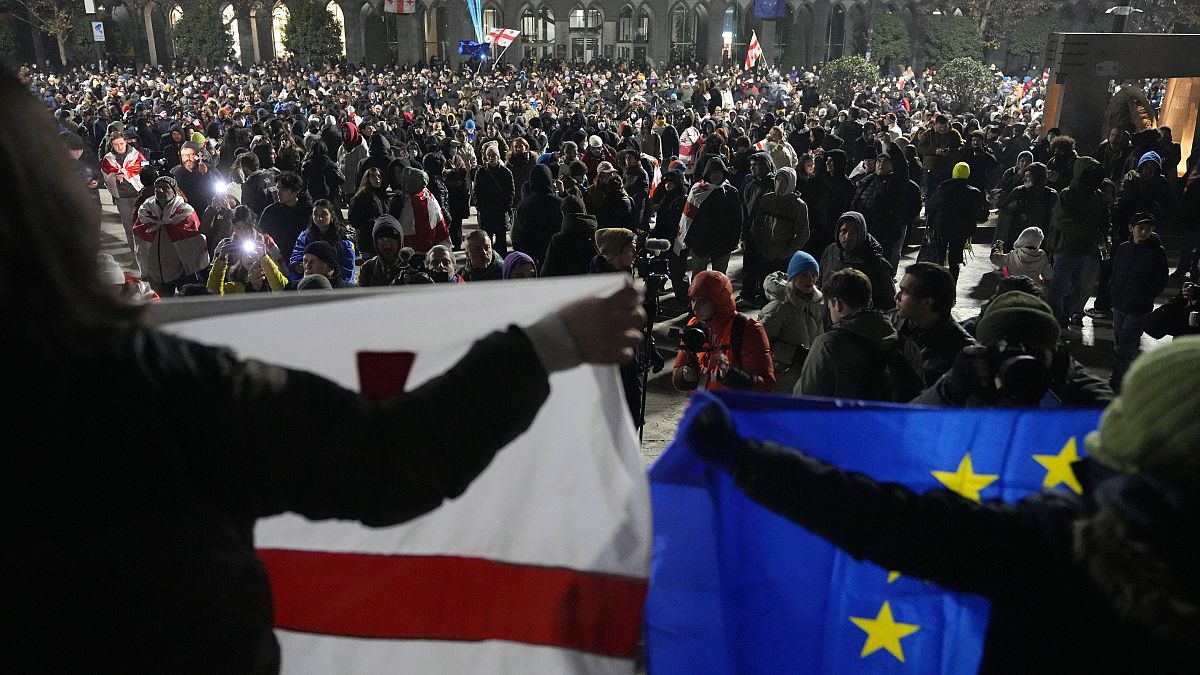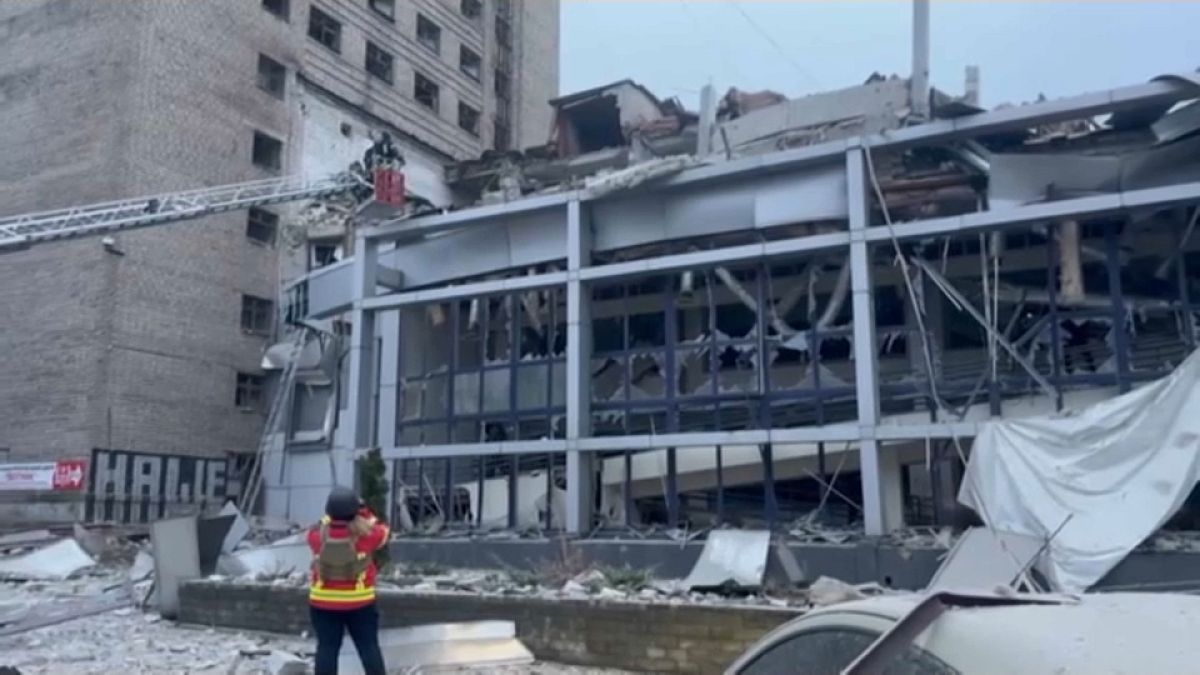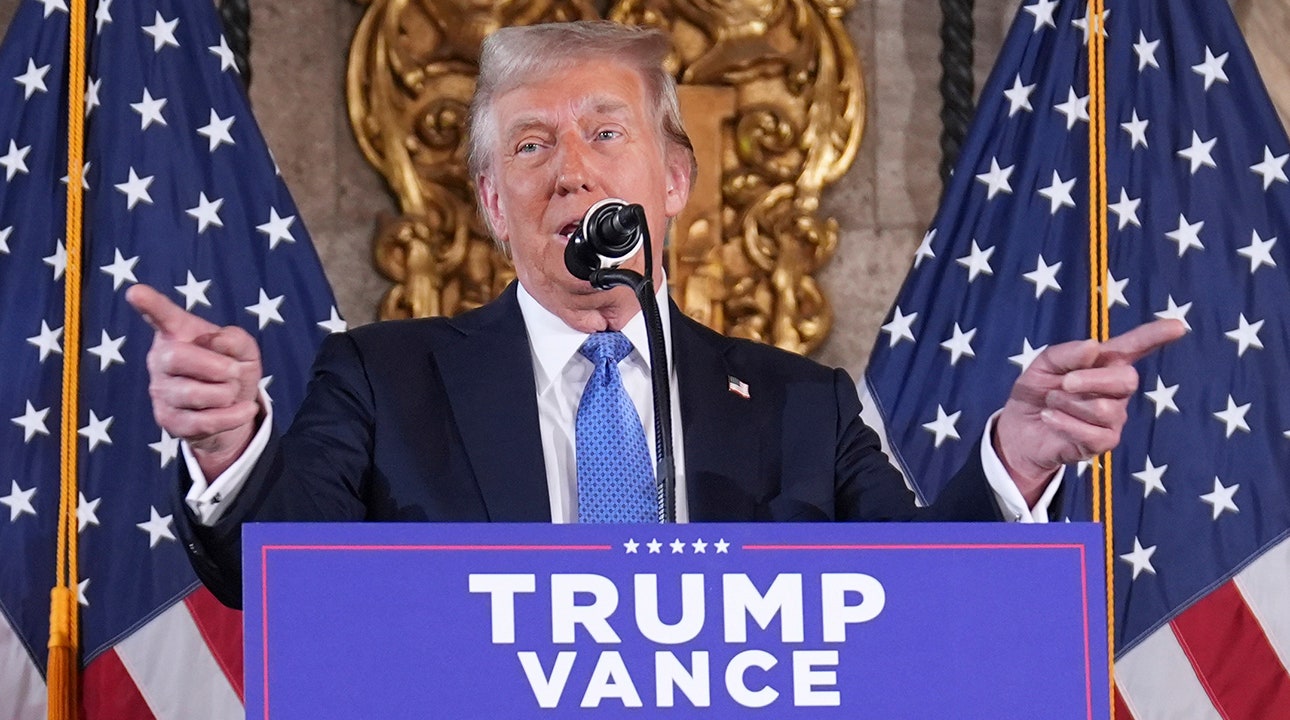World
Transnistria’s LGBT community fights Russian influence for its voice
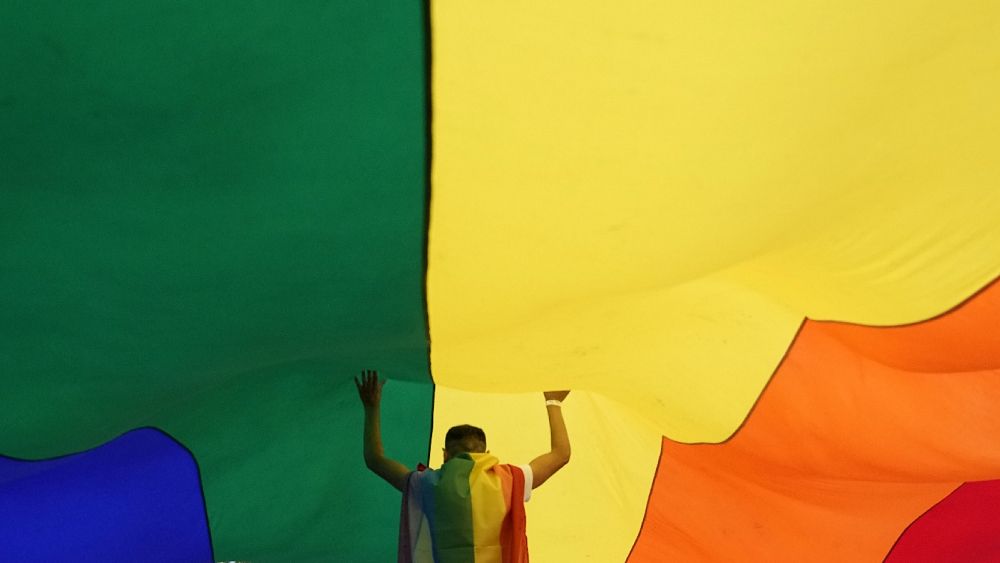
One holdover from the Soviet-era in Transnistria, an unrecognised territory between Moldova and Ukraine, is the attitude towards LGBT rights with no visual representation of LGBT people in society.
When Elena Shamshurova was 13, she started to develop feeling for girls, as well as boys. Like any person of her generation, she turned to the internet to get answers, seek out others like her and form a community of like-minded people. But when you live in Transnistria, this comes with particular risks.
“The hardest part was working out if everyone is who they say they are or are they a spy, troll or someone who’s trying to disrupt the group,” Shamshurova, now 19, tells Euronews.
The meet-ups she organised at the beach or in shopping centres quickly grew but so did the danger.
“There is just no such place where you can safely meet with a group – if someone’s seen with a rainbow flag they will immediately be asked to hide it or you’re going to get in trouble,” Shamshurova says.
“At the beginning, it felt pretty dangerous, as there were only a few people who you could actually trust. But it was amazing that people could actually share their feelings and get help from each other in this group.”
Hostile environment
Transnistria, an unrecognised territory between Moldova and Ukraine, announced its independence from Moldova in 1990 and has since become known as one of several post-Soviet frozen conflict zones. While the Transnistria War ceasefire ended the armed military conflict more than 30 years ago, the republic is not internationally recognised.
Another holdover from the Soviet-era is Transnistria’s attitude towards LGBT rights. Same-sex sexual activity was legalised in 2002, with this being one of few rights afforded to LGBT people in the territory. Not only is discussion of homosexuality in this breakaway region, also known as Pridnestrovie, a long-standing taboo but there is no visual representation of LGBT people in society.
Viewed by many in Transnistria as an abhorrent deviation from the norm, openly gay and lesbian people face abuse ranging from threats and verbal attacks to violent assaults.
“In schools, people are getting bullied for information they share on social media, especially for gay men. There are stories from our friends that guys are getting attacked and beaten inside schools by the teachers and classmates,” Shamshurova adds.
Members of the LGBT community, and allies who advocate for their rights, have been intimidated.
In 2017 when photographer Carolina Dutca announced the ‘No Silence’ exhibition to shed light on the situation of LGBT people in Transnistria, the KGB spoke to her and pressured her to cancel the event, she has said. After this meeting, and receiving calls and messages threatening her life, Dutca was forced to cancel the show.
A number of LGBT couples and individuals who lived in Tiraspol, the de facto capital of Transnistria, left the region in recent years, a source tells Euronews. The low level of political rights and civil liberties, combined with hostility towards LGBT people, leave little possibility for LGBT activism.
“All this gives the impression that the rights of LGBTQ+ people in Transnistria are not sufficiently protected, but the Transnistrian authorities treat this topic a little less aggressively than the Russian authorities,” says Nikolay Kuzmin, a Transnistrian journalist and political scientist.
Russian influence
For Shamshurova, the older generation who make up the majority of the population are stuck in an outdated mindset that holds back LGBT rights. “It’s really hard for younger people to make any impact at this point,” she says.
The lack of a free press in the nation makes advocating for LGBT rights in public an almost impossible task, she adds. The most recent report from human rights watchdog Freedom House finds that critical reporting in Transnistria can result in reprisals including criminal charges.
Legislation passed in 2016 increased the control over state media by authorities, including giving them power to appoint editorial staff. “The government is controlling pretty much all the news, events and views that exist in newspapers and on television,” she says.
“We’re struggling to try and fight for LGBT issues to be discussed, with support I think we can make an impact and gets more freedom for our views so that the older generation can hear our experiences.”
The full-scale Russian war of aggression in Ukraine brought more attention to the level of influence Russia has within Moldova and Transnistria.
Last March, the Council of Europe adopted a resolution recognising Transnistria as a Moldovan territory occupied by Russia.
For Angela Frolov, lobby and advocacy programme coordinator at GENDERDOC-M Information Centre, an organisation that works for the defence of LGBT rights in Moldova, access to support Transnistria’s LGBT population is severely limited due to the homophobic regime.
“We think that progress is possible just after Putin’s regime will fail and Transnistria will return under Moldova’s jurisdiction. I’m afraid that nobody can do anything there until they are away from under the Russian influence. The Russian secret services are very strong in the region – most of LGBT people prefer to leave Transnistria,” Frolov told Euronews.

World
TVLine Items: From Blood and Ash TV Series, Kelly Clarkson Renewed and More

ad
World
Trump says Turkey ‘did an unfriendly takeover’ in Syria as US-brokered cease-fire appears to fail

President-elect Trump on Monday described the recent fall of the Bashar al-Assad regime as an “unfriendly takeover” orchestrated by Turkey.
“I think Turkey is very smart,” he said from a press conference at his Florida residence. “Turkey did an unfriendly takeover, without a lot of lives being lost. I can say that Assad was a butcher, what he did to children.”
Assad fled to Russia just over a week ago after the al Qaeda-derived organization dubbed Hay’at Tahrir al-Sham (HTS) rapidly took over western Syria in an offensive that began on Nov. 27, first taking Aleppo, Hama and Homsc, before seizing the capital city of Damascus.
Rebel forces seized Mengh Airbase and the city of Tel Rifaat in the Aleppo countryside on Dec. 1, 2024. (Rami Alsayed/NurPhoto via Getty Images)
ASSAD PAINTS HIMSELF AS ‘CUSTODIAN’ TO SYRIA AS PICTURE UNFOLDS ON COLLAPSE OF DAMASCUS
The future of Syria, for both its government and its people, remains unclear as the HTS organization, deemed a terrorist network by the U.S. but which has the backing of the Turkey-supported Syrian National Army (SNA), looks to hold on to power.
The fall of the Assad regime has meant an end to the nearly 14-year civil war that plagued the nation, though the threat against the U.S.- backed Kurdish-led Syrian Democratic Forces (SDF) is not over as Turkey continues to view it as one of its chief regional adversaries.
The SDF have assisted the U.S. in its fight against ISIS for more than a decade, but Turkey, which shares a border with Syria, has long viewed the group as being affiliated with the extremist Kurdistan Workers’ Party (PKK), and which, through the SNA, has clashed with the Kurdish-led forces.
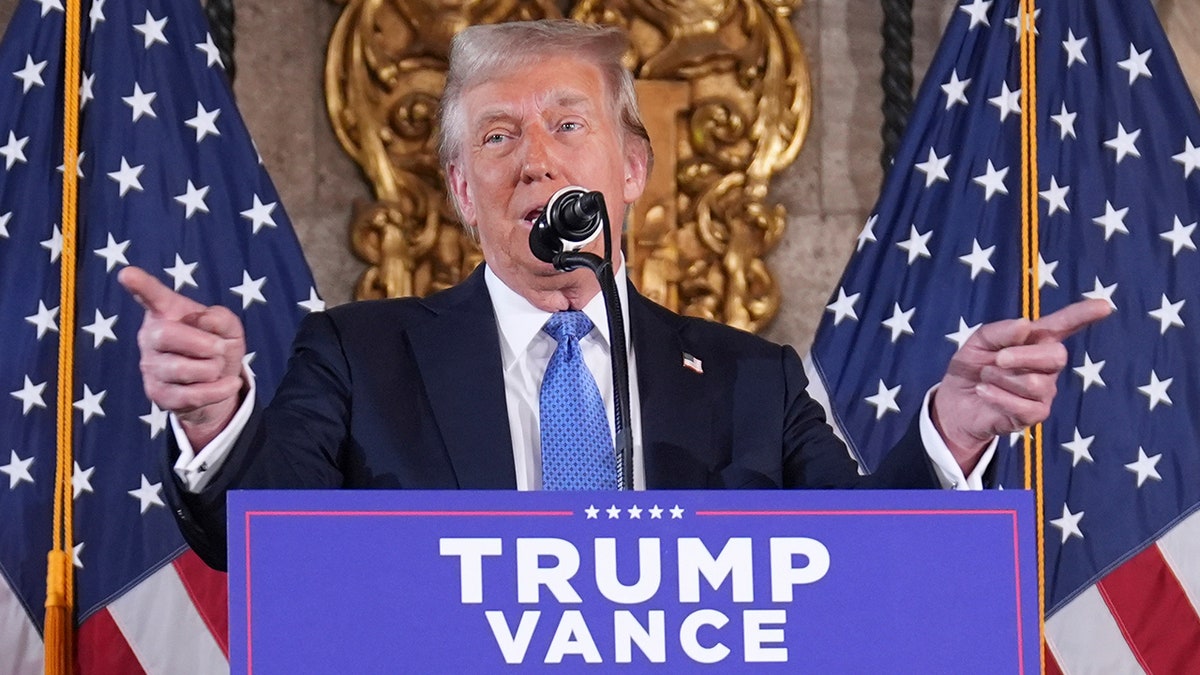
President-elect Trump speaks during a news conference at Mar-a-Lago, on Monday, Dec. 16, 2024, in Palm Beach, Florida. (AP/Evan Vucci)
It remains unclear how the Kurds will fair under a potential HTS regime, but Western security experts are increasingly concerned that Turkey could have an outsized amount of influence on the neighboring nation.
“The fall of Assad greatly amplified Turkey’s influence in Syria, giving unprecedented influence to his partners and proxies. If the United States wants to ensure that Syria has the best chance to become a reasonably free and stable country, it needs to keep a very close eye on [Turkish President Recep] Erdogan,” David Adesnik, vice president for research at the Foundation for Defense of Democracies, told Fox News Digital.
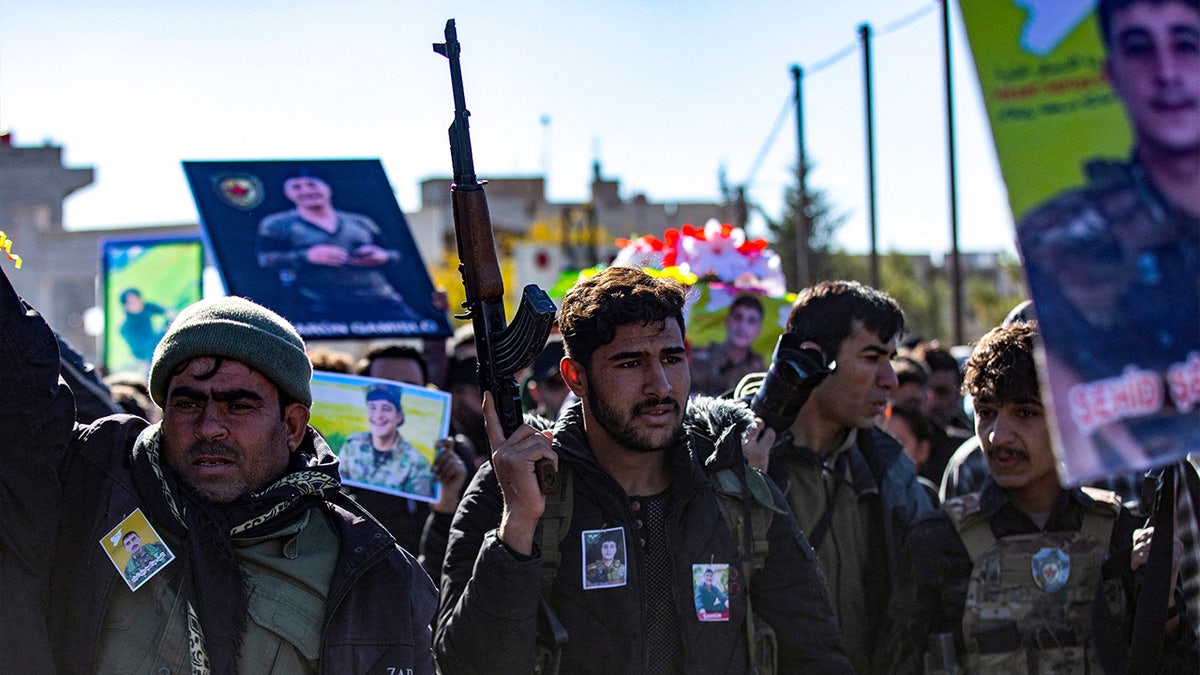
Comrades attend the funeral of five fighters of the Kurdish-led Syrian Democratic Forces who were killed during clashes with Turkish-backed opposition factions, in Qamishli in northeastern Syria on Dec. 14, 2024. (Delil Souleiman/AFP via Getty Images)
TURKEY HITS US-ALLIED KURDS IN SYRIA, IRAQ FOLLOWING TERRORIST ATTACK ON DEFENSE GROUP
Last week, the U.S. brokered a cease-fire agreement between the SDF and the SNA over the northeastern city of Manbij, where SDF coalition forces agreed to withdraw from the area after resisting attacks since Nov. 27, according to a Reuters report.
But sources told Fox News Digital on Monday that negotiations relating to the cease-fire had collapsed and that the SNA had begun building up military forces west of the Kurdish town of Kobani – roughly 35 miles east of Manbij – in an apparent threat to resume combat operations.
The terms of the cease-fire remain unclear, and neither the White House nor the State Department responded to Fox News Digital’s questions.
According to a statement released by the SDF, the mediation efforts by the U.S. failed to establish a permanent truce in Manbij-Kobani regions due to Turkey’s “evasion to accept key points,” including the safe transfer of civilians and Manbij fighters.
“Despite U.S. efforts to stop the war, Turkey and its mercenary militias have continued to escalate over the last period,” the SDF said.
A spokesperson for Turkey’s U.N. Mission did not immediately return Fox News Digital’s request for comment.
“The re-eruption of tensions around Kobani underlines the extent to which Assad’s fall has ‘opened the gates’ for Turkey and its SNA proxies in northern Syria,” Charles Lister, director of the Syria and countering terrorism and extremism programs at the Middle East Institute (MEI), told Fox News Digital. “For the first time, they’re free to act without a green light from Assad or Russia.”
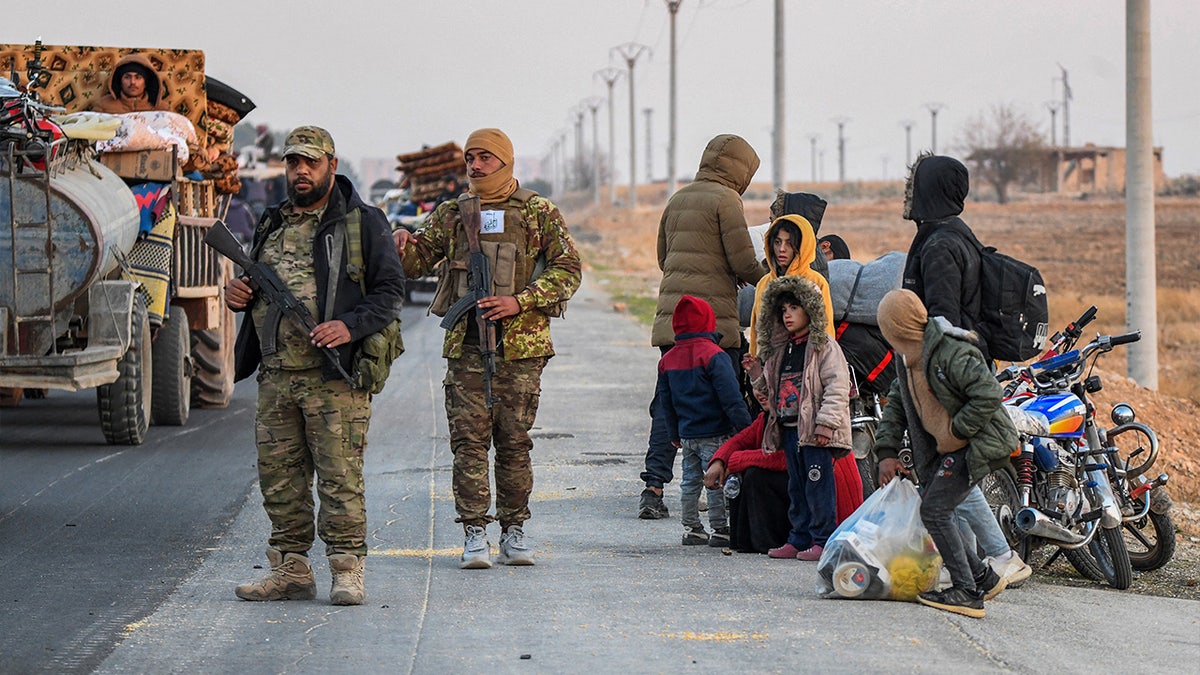
Anti-regime fighters stand on the roadside as displaced Syrian Kurds drive vehicles loaded with belongings on the Aleppo-Raqqa highway, fleeing Aleppo, on Dec. 2, 2024. (Rami Al Sayed/AFP via Getty Images)
The dynamic between the SDF and SNA forces, backed by Washington and Ankara, respectively, has long proved difficult to maneuver given that both the U.S. and Turkey are allies in NATO.
“After the loss of Tel Rifat and Manbij in recent weeks, the only possible obstacle to further SDF losses is the presence of U.S. troops – but Turkey’s role within NATO has always limited U.S. options,” Lister explained.
“[U.S. Central Command Gen. Michael’ Kurilla’s recent visit and the SDF’s willingness to cede Manbij spoke to the unprecedentedly isolated position the SDF currently faces,” he added in reference to a visit Kurilla made to Syria last week. “If the SDF is going to survive these challenges, it’s going to need to be extremely flexible, willing to concede on major issues, and rely heavily on U.S. diplomacy with Turkey.”
World
The Take: Why is Israel bombing Syria?

PodcastPodcast, The Take
As Syria opens a new chapter after Bashar al-Assad, Israel plans further settlement of the occupied Golan Heights.
As Syria navigates a fragile political transition, Israel has wiped out much of Syrian military assets, pushed further into Syrian territory and approved a plan to expand settlements in the occupied Golan Heights. How will Syria’s new leadership respond?
In this episode:
- Aymenn Jawad Al-Tamimi (@ajaltamimi), research fellow, Middle East Forum
Episode credits:
This episode was produced by Khaled Soltan and Tamara Khandaker, with Phillip Lanos, Spencer Cline, Hagir Saleh, Duha Mosaad, Chloe K Li and our host, Malika Bilal.
Our sound designer is Alex Roldan. Our video editors are Hisham Abu Salah and Mohannad Al-Melhem. Alexandra Locke is The Take’s executive producer. Ney Alvarez is Al Jazeera’s head of audio.
Connect with us:
@AJEPodcasts on Twitter, Instagram, Facebook, Threads and YouTube
-

 Technology1 week ago
Technology1 week agoStruggling to hear TV dialogue? Try these simple fixes
-

 Business1 week ago
Business1 week agoOpenAI's controversial Sora is finally launching today. Will it truly disrupt Hollywood?
-

 Politics4 days ago
Politics4 days agoCanadian premier threatens to cut off energy imports to US if Trump imposes tariff on country
-
/cdn.vox-cdn.com/uploads/chorus_asset/file/25782636/247422_ChatGPT_anniversary_CVirginia.jpg)
/cdn.vox-cdn.com/uploads/chorus_asset/file/25782636/247422_ChatGPT_anniversary_CVirginia.jpg) Technology5 days ago
Technology5 days agoInside the launch — and future — of ChatGPT
-
/cdn.vox-cdn.com/uploads/chorus_asset/file/25789444/1258459915.jpg)
/cdn.vox-cdn.com/uploads/chorus_asset/file/25789444/1258459915.jpg) Technology3 days ago
Technology3 days agoOpenAI cofounder Ilya Sutskever says the way AI is built is about to change
-

 Politics3 days ago
Politics3 days agoU.S. Supreme Court will decide if oil industry may sue to block California's zero-emissions goal
-
/cdn.vox-cdn.com/uploads/chorus_asset/file/25546252/STK169_Mark_Zuckerburg_CVIRGINIA_D.jpg)
/cdn.vox-cdn.com/uploads/chorus_asset/file/25546252/STK169_Mark_Zuckerburg_CVIRGINIA_D.jpg) Technology3 days ago
Technology3 days agoMeta asks the US government to block OpenAI’s switch to a for-profit
-

 Politics5 days ago
Politics5 days agoConservative group debuts major ad buy in key senators' states as 'soft appeal' for Hegseth, Gabbard, Patel


